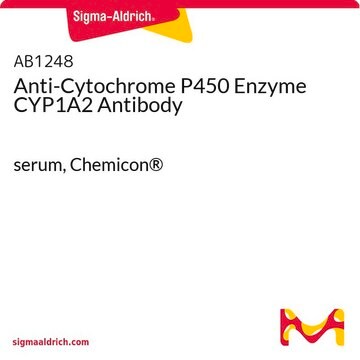AB1253
Anti-Cytochrome P450 Enzyme CYP3A1 Antibody
serum, Chemicon®
Sign Into View Organizational & Contract Pricing
All Photos(1)
About This Item
UNSPSC Code:
12352203
eCl@ss:
32160702
NACRES:
NA.41
Recommended Products
biological source
rabbit
Quality Level
antibody form
serum
antibody product type
primary antibodies
clone
polyclonal
species reactivity
rat
manufacturer/tradename
Chemicon®
technique(s)
immunohistochemistry: suitable
western blot: suitable
NCBI accession no.
UniProt accession no.
shipped in
dry ice
target post-translational modification
unmodified
Gene Information
rat ... Cyp3A23-3A1(25642)
Specificity
Reacts with rat cytochrome P450 enzyme CYP3A1 in hepatic microsomal fraction. No cross-reactivity with other cytochrome P450 enzymes including CYP3A2.
Immunogen
Synthetic peptide
Application
Research Category
Metabolism
Metabolism
Research Sub Category
Enzymes & Biochemistry
Enzymes & Biochemistry
This Anti-Cytochrome P450 Enzyme CYP3A1 Antibody is validated for use in IH, WB for the detection of Cytochrome P450 Enzyme CYP3A1.
Western blot
Immunohistochemistry on formaldehyde treated sections.
Optimal working dilutions must be determined by end user.
Immunohistochemistry on formaldehyde treated sections.
Optimal working dilutions must be determined by end user.
Physical form
Rabbit antiserum. Liquid. Contains no preservative.
Storage and Stability
Maintain at -20°C in undiluted aliquots for up to 12 months. Avoid repeated freeze/thaw cycles.
Legal Information
CHEMICON is a registered trademark of Merck KGaA, Darmstadt, Germany
Disclaimer
Unless otherwise stated in our catalog or other company documentation accompanying the product(s), our products are intended for research use only and are not to be used for any other purpose, which includes but is not limited to, unauthorized commercial uses, in vitro diagnostic uses, ex vivo or in vivo therapeutic uses or any type of consumption or application to humans or animals.
Not finding the right product?
Try our Product Selector Tool.
Storage Class Code
10 - Combustible liquids
WGK
WGK 1
Flash Point(F)
Not applicable
Flash Point(C)
Not applicable
Certificates of Analysis (COA)
Search for Certificates of Analysis (COA) by entering the products Lot/Batch Number. Lot and Batch Numbers can be found on a product’s label following the words ‘Lot’ or ‘Batch’.
Already Own This Product?
Find documentation for the products that you have recently purchased in the Document Library.
James R Reed et al.
Drug metabolism and disposition: the biological fate of chemicals, 51(9), 1196-1206 (2023-06-23)
Liver cytochrome P450s (CYPs) of the endoplasmic reticulum (ER) are involved in the metabolism of exogenous and endogenous chemicals. The ER is not uniform, but possesses ordered lipid microdomains containing higher levels of saturated fatty acids, sphingomyelin, and cholesterol and
Sofia Cussotto et al.
EBioMedicine, 66, 103307-103307 (2021-04-06)
The role of the gut microbiome in the biotransformation of drugs has recently come under scrutiny. It remains unclear whether the gut microbiome directly influences the extent of drug absorbed after oral administration and thus potentially alters clinical pharmacokinetics. In
Marta Rysz et al.
The Journal of pharmacology and experimental therapeutics, 389(1), 87-95 (2024-03-07)
The organic anion transporting polypeptide (OATP)2B1 [(gene: solute carrier organic anion transporter family member 2B1 (SLCO2B1)] is an uptake transporter that facilitates cellular accumulation of its substrates. Comparison of SLCO2B1+/+ knockin and rSlco2b1-/- knockout rats showed a higher expression of
Masami Doi et al.
Xenobiotica; the fate of foreign compounds in biological systems, 50(5), 506-514 (2019-08-14)
The inductive effects of dexamethasone on hepatic midazolam metabolism were examined in Wistar rats with acute renal failure (ARF) to clarify whether the ARF-related decrease in the hepatic expression of drug-metabolizing enzymes is caused by an impairment in the translation/polypeptide
Marta Kot et al.
Drug metabolism and disposition: the biological fate of chemicals, 45(12), 1336-1344 (2017-09-25)
Recent studies indicated an important role of the monoaminergic nervous systems (dopaminergic, noradrenergic, and serotonergic systems) and stress in the regulation of cytochrome P450 (CYP) expression and activity in the liver. The aim of our present research was to determine
Our team of scientists has experience in all areas of research including Life Science, Material Science, Chemical Synthesis, Chromatography, Analytical and many others.
Contact Technical Service





